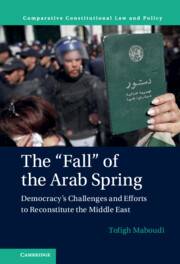Book contents
- The “Fall” of the Arab Spring
- Comparative Constitutional Law and Policy
- The “Fall” of the Arab Spring
- Copyright page
- Dedication
- Contents
- Figures
- Tables
- Acknowledgments
- Introduction
- 1 Constitutions, Civil Society, and Democratization in the Arab World
- 2 Democratizing the Parchments
- 3 Constitutional Negotiations and the Pathway to Democratic Transition
- 4 Pathways of Failure
- 5 Pathways of Failure
- 6 Pathways of Failure
- 7 Lessons from the “Fall” of the Arab Spring
- Bibliography
- Index
6 - Pathways of Failure
The Importance of Constitutional Design
Published online by Cambridge University Press: 31 March 2022
- The “Fall” of the Arab Spring
- Comparative Constitutional Law and Policy
- The “Fall” of the Arab Spring
- Copyright page
- Dedication
- Contents
- Figures
- Tables
- Acknowledgments
- Introduction
- 1 Constitutions, Civil Society, and Democratization in the Arab World
- 2 Democratizing the Parchments
- 3 Constitutional Negotiations and the Pathway to Democratic Transition
- 4 Pathways of Failure
- 5 Pathways of Failure
- 6 Pathways of Failure
- 7 Lessons from the “Fall” of the Arab Spring
- Bibliography
- Index
Summary
When the constitutional bargain process is non-inclusive and nonparticipatory, and when civil society fails to operate as a democratizing force, the constitutional outcome is not likely to resolve the political and societal ills of authoritarianism. Chapter 6 addressed several of these constitutional design issues. It first examines cases where constitutions failed to limit the arbitrary powers of the monarchs (Morocco and Jordan) or presidents (Egypt and Algeria) by utilizing a constitutional design that lacked textual clarity, adopting contradictory provisions, and creating parallel institutions. Next, the chapter examines “non-consensual” constitutional designs in deeply divided societies. First, in countries where an ethnoreligious minority ruled against the majority’s will (Bahrain and Syria), new constitutions failed to institutionalize power-sharing. Second, where regional cleavages, rivalries, and grievances were prominent issues, as in Yemen and Libya, federalist and region-based power-sharing constitutional arrangements failed to prevent conflict. Lastly, where a country was deeply divided across ideological and identity lines (as was Egypt in 2012), winner-take-all approach to constitutional drafting alienated half of the population, leading to the failure of the constitution and the democratic transitional process.
Keywords
- Type
- Chapter
- Information
- The 'Fall' of the Arab SpringDemocracy's Challenges and Efforts to Reconstitute the Middle East, pp. 193 - 228Publisher: Cambridge University PressPrint publication year: 2022

